Running an ETH Validator for the Barely Motivated
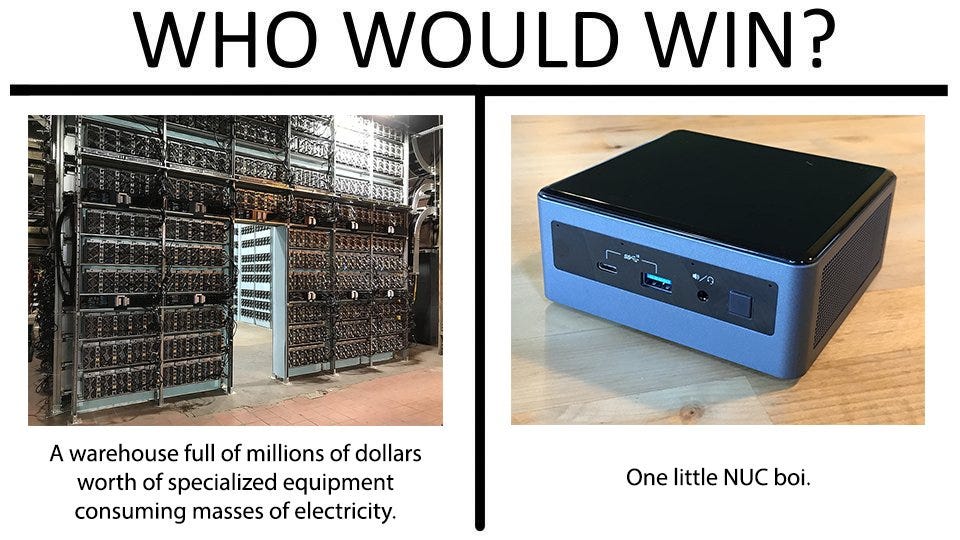
Level up your crypto finance game five times a week. Get on the Bankless Program.
Dear Bankless Nation,
Running an ETH validator can be a pain.
Scrapping together the hardware from old computers (or buying new stuff), running a Linux terminal to get set up, and making sure it’s all secure enough for your precious ETH….it ain’t easy to stake right now.
Most people just want a “plug-and-play” solution to start earning a ETH-denominated passive income (here’s how much you’ll need to retire btw).
So we brought in Justin to give us a rundown on how the barely motivated can do their civic duty and become an Eth2 validator. And there’s some great turnkey solutions.
DAppNode and Avado are two solid options. They give you the proper hardware and a nice UI to work from. For the non-technical people out there, this is what you need to get started. And because they love this community, they were willing to drop these special deals just in time to stake your ETH.
- Get $30 off DAppNode Hardware with code “GoBankless30” 🎁
- Get 5% off Avado Hardware with this link 🎁
(These promos only last for the next week!)
Last thing—both these solutions run on passion and open source software. So it’s a noble thing to support their efforts. They make participating in Ethereum easy, for anyone. 🙏
- RSA
🙏 Sponsor: Argent – DeFi in a tap (👈 go download this wallet now - RSA)
THURSDAY THOUGHT
Guest Post: Justin Leroux, Business Development and Marketing at GridPlus
Running an ETH Validator for the Barely Motivated
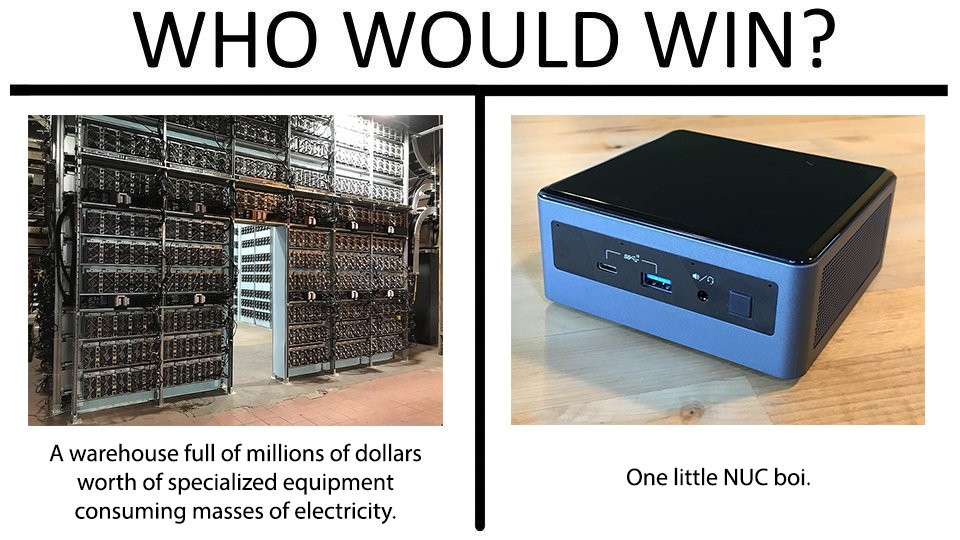
With the launch of beacon chain deposit contract, Ethereum has embarked on the journey of switching its consensus mechanism from proof-of-work to proof-of-stake. This has the potential to democratize the process of providing blockchain network security and lead to a degree of decentralization and network resilience not possible today with PoW.
While PoS eliminates many of PoW mining’s barriers to entry, securely staking your ETH at home (and being able to sleep at night) requires a degree of technical expertise that might discourage many would-be participants. This is especially true in the earliest stages of launch before true plug-and-play solutions are available.
The good news is that there are options for the less technical among us. You don’t need to be a professional Linux systems administrator to pull it off and the tools available are only going to get better from here on out.
Just over a year ago I wrote a guide titled Running Ethereum Full Nodes: A Guide for the Barely Motivated explaining how anyone could easily run nodes at home via packages from DappNode and Avado. They take everything you need to run a Linux server supporting decentralized networks and let you manage it all from a simple web interface on your phone or laptop. I run servers from both systems and they are perfect for anyone who wants to run a node but dreads the command line interface.
I’m not an eth2 researcher, implementor, or even a software developer—but that’s why I’m writing this piece. Because even I can do this. So if you’re even moderately computer proficient, then so can you.
And you can earn a great return on your holdings in the process.
Why Bother?
One of the most common questions I received after publishing last year’s piece was how much money someone could earn from running an Ethereum node. At the time the answer was not much, if anything.
So why do thousands of people run nodes at home? Some want to connect MetaMask and others tools directly to their own node for the additional security guarantees and to avoid reliance on large scale endpoints many applications use by default. For others, it’s a desire to contribute to the network health of a platform that enables financial sovereignty without trusted rent seeking intermediaries.
However, anyone who’s been involved in crypto for long knows the concerning ratio of idealists to opportunists. Altruism is wonderful, but blockchain is all about proper incentive alignment. Blockchains are machines which input self-motivated behaviors and output a public good. This is why it’s important to eliminate the distinction between financially incentivized miners and largely altruistic home node maintainer—everyone who wants to contribute should be rewarded.
Running your own server at home not only allows you to earn staking returns, but you’ll find it to be a rewarding experience that broadens and deepens your understanding of crypto and other decentralized networks that aid us all in the pursuit of unfettered control of our finances and a freer and more open internet.
DappNode
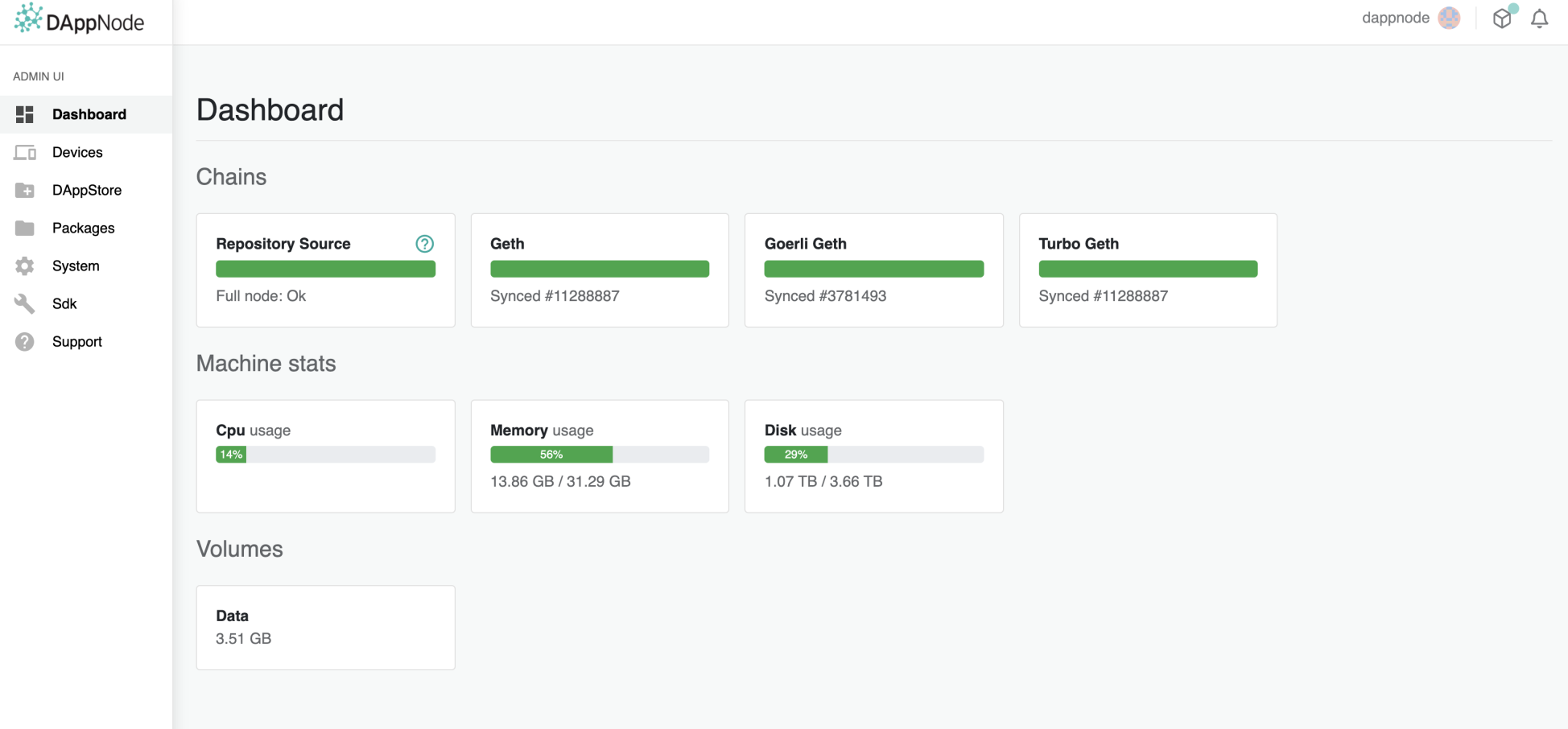
DappNode is a free open source software package that includes everything needed to set up a computer as a server running an Ethereum node, an IPFS node, and a lot more. It includes everything down to the operating system itself: Debian 10. You can either download the package and do a clean install yourself or purchase a preconfigured system directly from the team.
That still sounds fairly technical, right?
It’s a lot simpler than it sounds. Once you’re set up you can manage all of this from a simple web dashboard accessible from anywhere after connecting via VPN.
DappNode uses OpenVPN. During setup you’ll get a link to download an OpenVPN configuration file on your primary computer and once you import, you suddenly have X-Ray goggles for the decentralized web. IPFS and ENS addresses will resolve in all of your browsers without the need for an additional plugin.
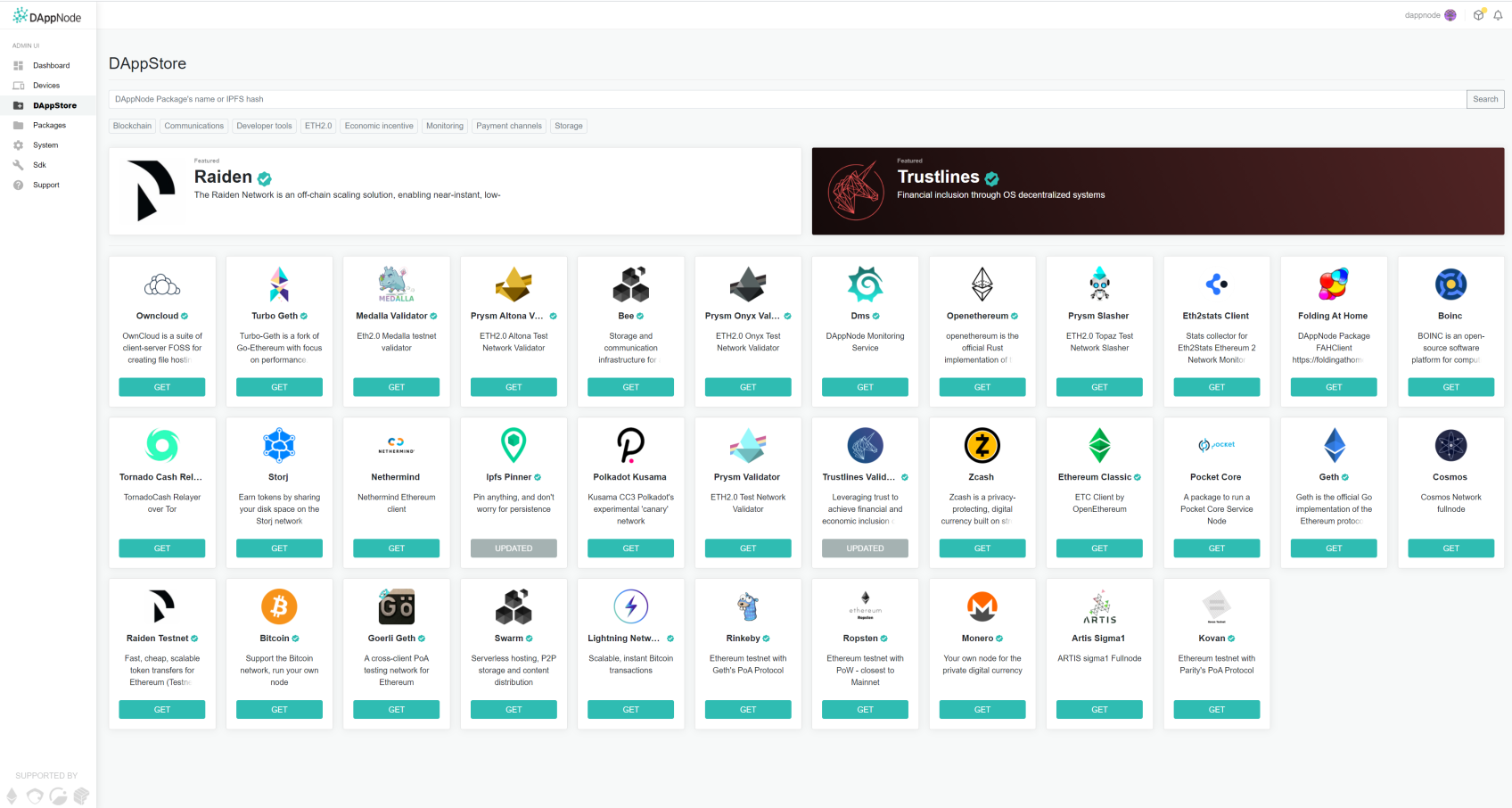
The DAppNode team has dedicated a lot of thought and effort to ensuring they bring this same degree of convenience to running your own eth2 validators at home. Their UI holds your hand through the setup process: it will direct you the steps on the eth2 Launch Pad, including key generation, then allows you to monitor it all from the dashboard.
Using DAppNode to run validators for the many public eth2 testnets has been a snap and I would suggest that anyone staking at home practice by depositing to a testnet first! With 32ETH or more on the line, you owe yourself at least one practice run and ideally more than that.
When it comes to mainnet support, DAppNode will allow you to choose between the Prysm and Lighthouse clients, toggle between the two if desired, and eventually launch their respective client dashboards right from the web UI.
The team wants to make it as easy as possible to support network health through client diversity and plans to implement the Nimbus and Teku clients as options down the line as well. It will also support the monitoring tool Grafana which provides convenient visual analysis of your validators’ activity and can even be configured to send you Telegram alerts if there is an issue with your system.
👉 Want to run your own validator with dAppNode Hardware? Get $30 off with the code “GoBankless30”.
You can also donate to DAppNode to support their efforts. Open source software is the backbone to a bankless future, make sure to help them on their mission! 🎁
Avado
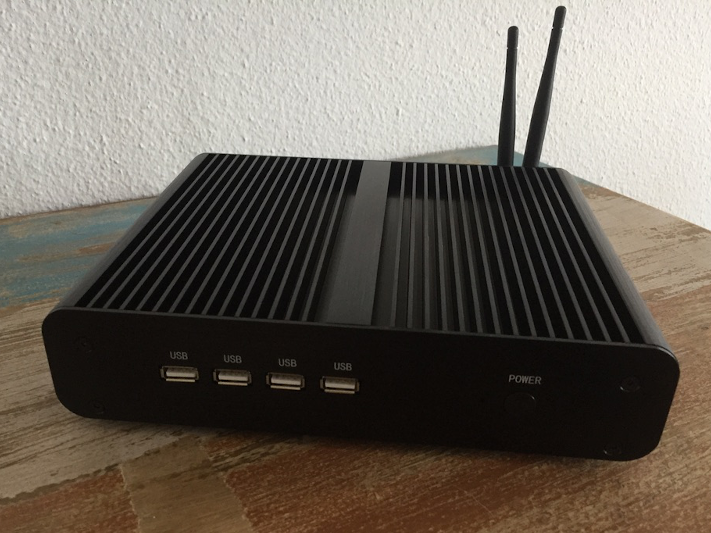
Avado began life in 2018 as a fork of DAppNode that made calculated tradeoffs to make running your own node even simpler.
While DAppNode initially relied on a synced Ethereum node for verification that the IPFS packages were the correct versions, Avado chose to maintain their own list of available applications so it would be faster and simpler for people to support any network of their choosing. While much of what is under the hood remains the same between both options, Avado chose to compete on convenience and has dedicated effort to supporting staking for additional chains.
While Avado offers many of the same packages as DAppNode they have developed distinguishing features over time such as the RYO Cloud which lets you opt into sharing your nodes as an endpoint for other users.
This provides an alternative to Infura and other popular services offering access - anyone can opt to connect to the RYO Cloud as an Ethereum endpoint and requests are balanced between all the volunteers’ servers.
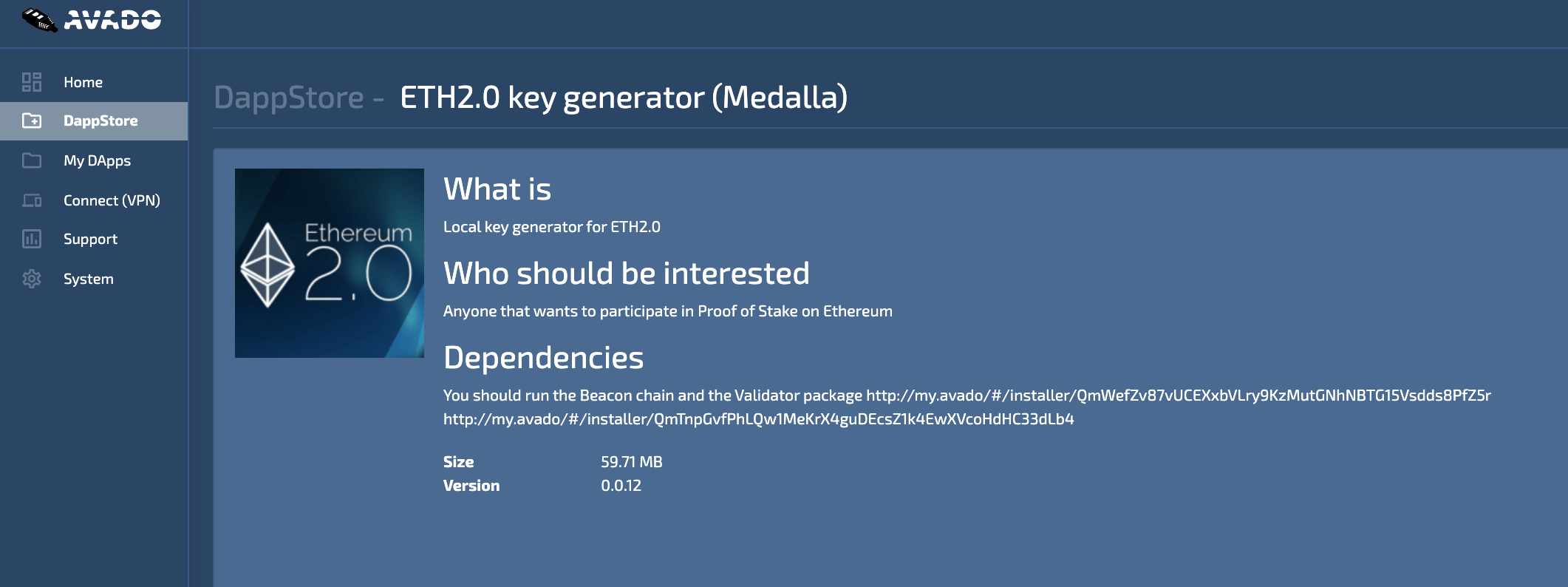
At launch, Avado will support the Prysm client with an important distinguishing feature: They circumvent the official Launchpad and instead provide a bespoke key generation and management tool directly in their web interface.
The team believes that people will always gravitate towards the most convenient solutions which is a compelling perspective.
I believe DAppNode and Avado both are fine options and I hope to see the teams compete and push each other forward, because in the end, the goal is to get as many people running their own servers to build the decentralized future that we’re all here for.
👀 Like what you see? Want to become an Eth2 Validator? Get 5% off an Avado hardware node!
I’m Interested – What Do I Need to Get Started?
The two routes you can take are setting up your own system and loading the DAppNode image or buying a preconfigured system that’s ready to go once you plug it in.
If convenience is your goal, I suggest the latter—you will pay a bit more for the server hardware but avoid having to set it up yourself. Neither of these projects are large commercial endeavors either, they’re driven by passion and your purchases support further development and new features for your system.
When selecting a system, I would suggest going for a more powerful choice to ensure you have room to grow. You may only be focused on running an eth2 validator, but you’ll soon discover a lot more and may want to explore other ways you can generate income from your server, such as running a TornadoCash relay.
🧠 The i7 based systems are really powerful! You’ll be able to run your validators as well as a Turbogeth Ethereum archive node and more.
Using your own hardware is a great way to repurpose an existing desktop computer. If your system meets the requirements outlined on the DAppNode site you can directly download the DAppNode image and then load it onto a USB thumb drive using an application called Etcher. Boot up your server with the USB drive inserted and you’re on your way.
Regardless of what route you choose, you should join the online communities such as DAppNode’s Discord server or Avado’s Telegram group to compare notes, get help, and then eventually lend a hand to newcomers as well. While these systems make running your own validators at home much easier, staking is not yet a set-it-and-forget-it endeavor and you will still have questions at some point.
Beyond that, I will defer to the many excellent guides out there that cover additional logistical considerations.
The Bankless Validator Guide is an excellent starting point—even if you go with a DAppNode or Avado system you should review the suggested system specs there and explore the list of additional resources. I also strongly suggest getting involved in the EthStaker community which is comprised of others running their own servers.
Conclusion
DAppNode and Avado are likely to remain the easiest way to run your own eth2 validator at home in the near future.
Running your own server contributes to the collective vision of a resilient, censorship-resistant, decentralized global network and you can earn significant returns on your holdings for your contribution.
If you’re on the fence, dive in! These systems are continuously improving – they’re getting easier to use and making it possible to earn additional income streams by running your own nodes. You’ll soon discover that being an active contributor to the Bankless revolution is both financially and personally rewarding.

Action steps
Research the best plug-and-play hardware solutions
Get $30 off DAppNode hardware with code “GoBankless30”
Stake your ETH!
Grab some Eth2 Staking Propaganda
Author Bio
Justin Leroux leads business development and marketing for GridPlus, manufacturer of the next generation Lattice1 hardware wallet. Prior to focusing on Ethereum fulltime, he was a fungible cog in the legacy financial system working at State Street and JPMorgan Chase.
Subscribe to Bankless. $12 per mo. Includes archive access, Inner Circle & Badge.
🙏Thanks to our sponsor
Argent
You were promised the future of money. Instead you got '90s banking UX and a paper password. Enough is enough. Argent protects your assets and gives you peace of mind. Earn interest and invest in a tap. No seed phrase. No problem. This is one of the best DeFi mobile wallets in the game today. Start exploring DeFi on the go with Argent. 🔥

👆Guys…this is my #1 recommended DeFi wallet. Stop reading this and go download it. - RSA
Not financial or tax advice. This newsletter is strictly educational and is not investment advice or a solicitation to buy or sell any assets or to make any financial decisions. This newsletter is not tax advice. Talk to your accountant. Do your own research.
Disclosure. From time-to-time I may add links in this newsletter to products I use. I may receive commission if you make a purchase through one of these links. I’ll always disclose when this is the case.